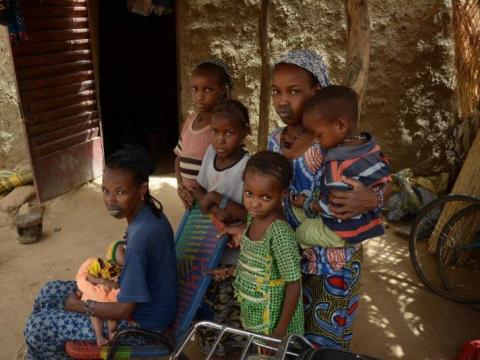I still feel afraid

It’s been proven that women and children are the most vulnerable groups in a conflict situation, particularly in a complex, silent and sensitive ethnic conflict like the current one in Central Mali. Security in the central and northern regions of the country has witnessed gradual decline since 2012, causing an increasing number of families to flee their homes, due to inter-ethnic conflict, and attacks on local authority and institutional structures, in areas that are becoming more difficult for humanitarian organizations like World Vision to access.
This was the fate of Mariama Bari (30) a mother of 6 girls (age 14 to 1 months old), who had to flee her village 17 days ago leaving behind everything. During our encounter in the community that hosts her family, Mariama explained her terrible ordeal: “I was sleeping with the children, when around 5 am I heard gunshots. I started screaming and the children started crying. We did not know where the noise was coming from, so we ran out of the house into the bushes and we stayed there until we could no longer hear gunshots” says Mariama while trying to breastfeed little Aminata Bari (one month old) in her lap.
Before the attacks Mariama's life wasn’t difficult. She used to sell fresh cow milk in the nearby villages or sometimes on market days, and two of her daughters used to attend a literacy center near their village. With her earnings from the small business, Mariama used to buy ingredients to prepare food, millet or rice.
Mariama Bari was one of the lucky ones, because her house wasn’t burned and she was able to leave the village alive with her six children “when we returned to the village after being in hiding, most of the houses where burned to the ground and four people were killed. The attackers only kill men”. Mariama’s husband left the village days before the attack, so he wasn’t present on the day of the attack. When I asked for her husband's whereabouts, Mariama was reluctant to give his location “I know that he is ok” says Mariama turning away and looking into the opposite direction. According to Mariama, the same people prowled her village days before the attack, so the husband decided the leave the village because of that.
After the attack, Mariama, other women and children decided to leave the village by foot, and walk two kilometers to safety. Despite the journey to a nearby village, the 30-year-old mother of six young children still feels frightened and very shaken by the events. Trying without success to breastfeed her little one Mariama adds: “We are not able to sleep since we arrived here. My children have nightmares and we see the same people sometimes here prowling the village. I still feel afraid, because we are not safe here. We are about 30 people sleeping in 3 small houses and it’s difficult to cook here because we don’t have enough pots and pans”.
Mariama’s family show visible signs of fear and trauma due to what they experienced. Later she told me that she is not able to breastfeed little Amitata Bari, because she has no milk. Although the family didn’t seem to lack food in the host village, Mariama and her children clearly appeared malnourished.
According to the Office for the Coordination of Humanitarian Affairs (OCHA) reports, 165.000 children are suffering from malnutrition in the Central Mali crisis. There also have been reports that visits to local health centers in the area have declined drastically due to insecurity, so district health and sanitation representatives fear the worst. With the limited medical services provided to vulnerable groups, like children under 5, as well as pregnant and lactating women, there are fears that people will resort to traditional alternative health practices. With the insecurity, routine vaccination campaigns at the village level have been suspended, affecting thousands of children under 5, including Mariama’s little ones.
One other concern is the children affected by trauma or psychological issues due to witnessing or suffering violence during the conflict. For that vulnerable group, the sad reality is that they need special attention and Psychosocial support, skills that are not often available in all health centres, so victims have to be identified and referred to organizations that can support.
The big risk is that Mariama’s family may fall under the same statics, but you have the power to reverse the situation by supporting World Vision’s health and nutrition response program in the area. The program is planning to reach 828 children suffering from severe malnutrition, train 29 people working in or with the health services (all Nutrition staff and World Vision staff, Health nutrition staff, maternity staff) on the new Community-based Management of Acute Malnutrition (CMAM) protocol and provide 75 kits to groups that support activities linked to nutrition, locally called” groupes de soutien aux activités de nutrition” (GSAN) to 75 villages through community health centers. The activity will reach pregnant and lactating women and children under 5.
Before I left the village, Mariama told me that she hopes that peace comes soon, because she wants to go back home with her children. Her words touched me, and I hope they touch you too.